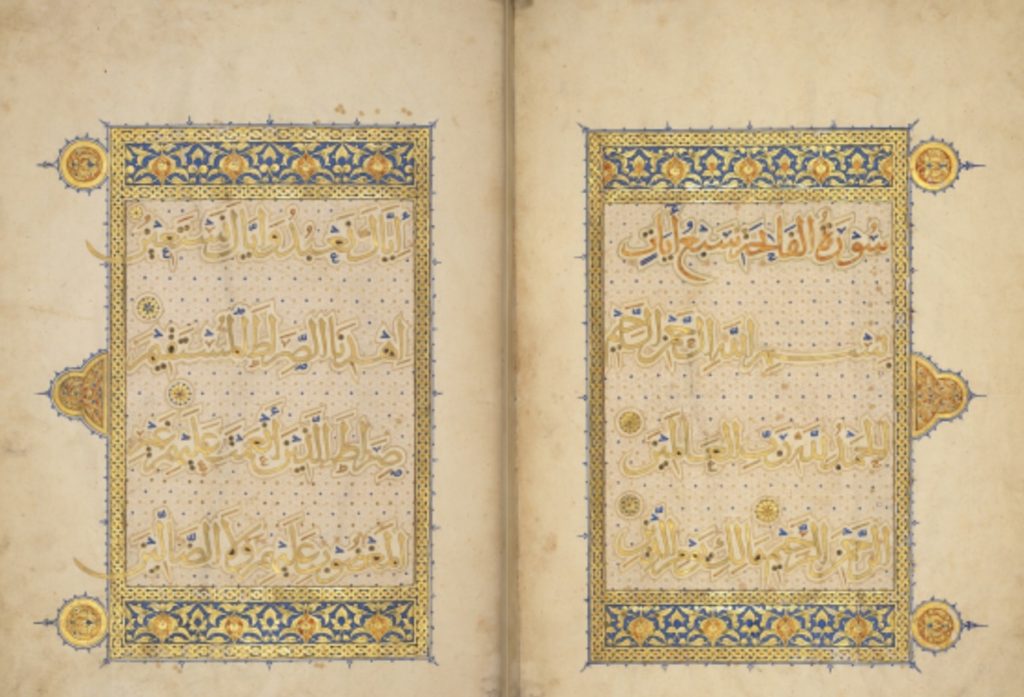
If a military liaison officer relayed a message from the division’s commander-in-chief and said: “Your commander has ordered that you obey only him”, what would we understand from this sentence? The military liaison officer is transmitting the commander’s order to his military division as a military command. And this order is a message quoted from the commander by another person. That is, the speaker is not the commander himself, but another person acting on his behalf by transmitting the message or the order to the addressee.
NOW IF WE COMPARE the phrase of this message with a Qur’ānic text from sūrat al-Isrā’ verse 23: Thy Lord hath decreed, that ye worship none save Him[1] – we may ask: who is the speaker here?
He is a person who is transmitting words about Allah but is not Allah Himself because he says: Thy Lord hath decreed … save Him. The phrase indicates the absence of the direct words of Allah in the sentence, and that Allah is not the speaker of this phrase. Allah would otherwise not have said save Him about Himself.
So who is the speaker in the Qur’ān in this text? The answer is the author of the Qur’ān – Muḥammad. And what is the transmitter of the message talking about? He is transmitting words issued by Allah, whom he refers to in the third person (that ye worship none save Him).
Do the texts of the Qur’ān constitute the direct speech of Allah?
So Him is a pronoun that refers to Allah who is in the third person in the speaker’s transmission of the message. Allah is not the speaker. The conclusion is therefore that the verse is relayed by a second person and is not direct speech from Allah to the interlocutor of the believers.
Do the texts of the Qur’ān constitute the direct speech of Allah? If the speaker was Allah, He would have said:
I, your Lord have decreed, that ye worship none save Me
as in the verse:
I created the jinn and humankind only that they might worship Me.[2]
This is direct speech, where the sentence indicates who the speaker is: the Creator, who is Allah. It is clear who is the speaker and who is the addressee.
This is just as it is in the Torah where God gives a direct instruction to the addressees the Prophet Moses and his people:
I am the Lord your God …You shall have no other gods before me.[3]
It is clear here who is the speaker and who is the addressee. We cannot deny that God is the speaker here.
Now if the speech in the Qur’ān were indirect speech, the word qul (‘say’) would have preceded the direct words of Allah like this: Say: Thy Lord hath decreed, that ye worship none save Him. The sentence would thus be clearer and more acceptable. So this verse, and many other passages in the Qur’ān, are actually Muḥammad’s words about Allah and not Allah’s direct words to the people.
In one and the same sentence we see how the speech moves from the singular to the plural:
Thy Lord hath decreed, that ye worship none save Him.
Is the addressee a single person to whom is said: thy Lord and not your Lord? Or a plurality of persons who are told: that they not worship? Either the whole sentence comes in the form of Allah who speaks to the single addressee: Thy Lord hath decreed, that thou worship none save Him or the addressee is in the plural: Your Lord hath decreed, that ye worship none save Him.
In the opening sūra of the Qur’ān a similar phrasing also demonstrates that the speaker is not Allah:
In the name of Allah, the Beneficent, the Merciful. All praise is due to Allah, the Lord of the Worlds. Master of the Day of Judgment. Thee do we serve and Thee do we beseech for help. Keep us on the right path…
If the Qur’ān and all its verses are the words of Allah, who is the speaker here and to whom is the speaker addressing? If these are the words of Allah are addressed to mankind, to whom is Allah addressing when he says: Thee do we serve and Thee do we beseech for help? And if these are the words of Allah that He wishes worshippers to say during prayer and supplication, He would have begun the verse as follows:
Say: Our Lord, Thou art the Master of the Day of Judgment. Thee do we serve and Thee do we beseech for help. Keep us on the right path…
Would this phrase have been more eloquent? And does this not indicate that the speaker is composing words which he places upon Allah’s tongue?
Why is it that the commentators evade and turn the texts upside down, when it is clear that the one who said them is not Allah, and that they are the words of a human being written down in the Qur’ān, with the claim that they are the words of Allah? The wording is clear evidence that the speaker is not Allah, for He would not be saying: Thee do we serve and Thee do we beseech for help.
In one and the same sentence we see how the speech moves from the singular to the plural
When Allah speaks and sends a message to His prophets, He speaks in His own name and as the speaker who is present. He says that He created the heavens and the earth[4] and I am the Lord your God …You shall have no other gods before me in the first person singular. And in the plural He says: We created the heavens and the earth[5], We have created you from dust – that is, He employs the first person pronouns I or We.
But if Allah speaks and says: He, who created you from dust[6] … there is no god but He … He is the Mighty, the Wise, the speech will appear strange and a source of doubt as to whether the speaker is not Allah, but another person who speaks in Allah’s name and claiming that Allah is the speaker.
This suspicious contradiction is repeated in the Qur’ān, where Allah speaks in the first person saying I created the jinn and humankind only that they might worship Me and sometimes saying: There is no god but (He) the Mighty, the Wise.
Let us take some brief examples from sūrat al-Baqara and observe the differences there when Allah speaks:
And when thy Lord said unto the angels: “Lo! I am about to place a viceroy (caliph) in the earth”, they said … He said: Surely I know what you do not know … And He taught Adam all the names, then presented them to the angels; then He said: Tell Me the names … He said: O Adam! … Then when he had informed them of their names, He said: Did I not say to you that I surely know what is hidden in the heavens and the earth and (that) I know what you disclose … And when We said to the angels … And We said: O Adam! … and We said: Fall down … Then Adam received (some) words from his Lord … Lo! He is the relenting, the Merciful. [7]
Whoever studies this text will find the text moving from Allah speaking in the third person (thy Lord said, He said, He taught) to the first person plural (when We said, And We said). Is the speaker saying I or We or He?

Suggested Reading
Is this the eloquent Book revealed in ‘a clear Arabic tongue’, and the miracle of rhetoric, eloquence and clarity? Does these verbal confusion as to one speaking not indicate that the Qur’ān is written by human beings who at times make mistakes or errors by changing from the singular to the plural, from a present pronoun to an absent third person pronoun, and do not settle upon a consistent form in a Book that is held to contain all the words of Allah?
In other verses of this sūrat al-Baqara the same mistakes as the earlier ones are repeated. Here we find Allah saying:
When We delivered you from Pharaoh’s folk … when We parted the sea for you … We saved you and drowned the followers of Pharaoh … Then We pardoned you … And when We gave Musa the Book … Then We raised you up … And We made the clouds to give shade … We sent to you manna … good things that We have given you … And when We said … We will give more … And when We took a promise from you and lifted the mountain over you … We have given you …[8]
After the repeated transitions between the past and present tense, the subject We returns to the absent third person singular form of the pronoun He, saying: were it not for the grace of Allah to you[9] instead of were it not for Our grace to you. It then continues in the third person singular with the words: And We said: ‘smite him’ … thus Allah brings the dead to life, and He shows you His signs.
Why did the speaker move from We to He the same verse? Is it Allah who says: Allah is mighty over all things? Who is the one speaking in the Qur’ān: Allah as the absent speaker or Muḥammad as a stand-in for Allah?
If Allah is not the present speaker in most verses and is referred to in the third person (He), why do you say that the Qur’ān is the word of Allah? They have admitted that it is a book written by Muḥammad because the speech in it is exposed as such and its errors clear to intellectuals, and it does not need philologians to highlight its grammatical and rhetorical mistakes.
[1] وَقَضَىٰ رَبُّكَ أَلَّا تَعْبُدُوا إِلَّا إِيَّاهُ
[2] Qur’ān LI (al-Dhāriyāt), 56: وَمَا خَلَقْتُ الْجِنَّ وَالْإِنْسَ إِلَّا لِيَعْبُدُونِ
[3] Exodus 20:2-3.
[4] The phrase in this form ( خَلَقَ السَّمَاوَاتِ وَالْأَرْضَ) appears very frequently in the Qur’ān, for example at: 6:1; 6:73; 7:54; 10:3; 11:7; 14:19; 16:3; 17:99; 25:59; 27:60; 29:44; 31:25; 32:4; 36:81; 39:5; 43:9; 45:22; 46:33; 57:4; 64:3 (Ed.)
[5] Examples are at Qur’ān 15;82; 44:38; 46:3; 50:38 (Ed.)
[6] Examples are at Qur’ān 3:59; 18:37; 22:15; 30:20; 35:11; 40:67 (Ed.)
[7] Qur’ān II (al-Baqara), 30-37.
[8] Qur’ān II (al-Baqara), 49-53; 56-58; 63.
[9] Qur’ān II (al-Baqara), 64.
Main image: Qur’ān I (Surat al-Fatiha) 1-7 – from an illuminated Qur’ān commissioned by the Mamluk sultan Rukn al-Dīn Baybars (1223-1277). British Library Add MS 22406.
